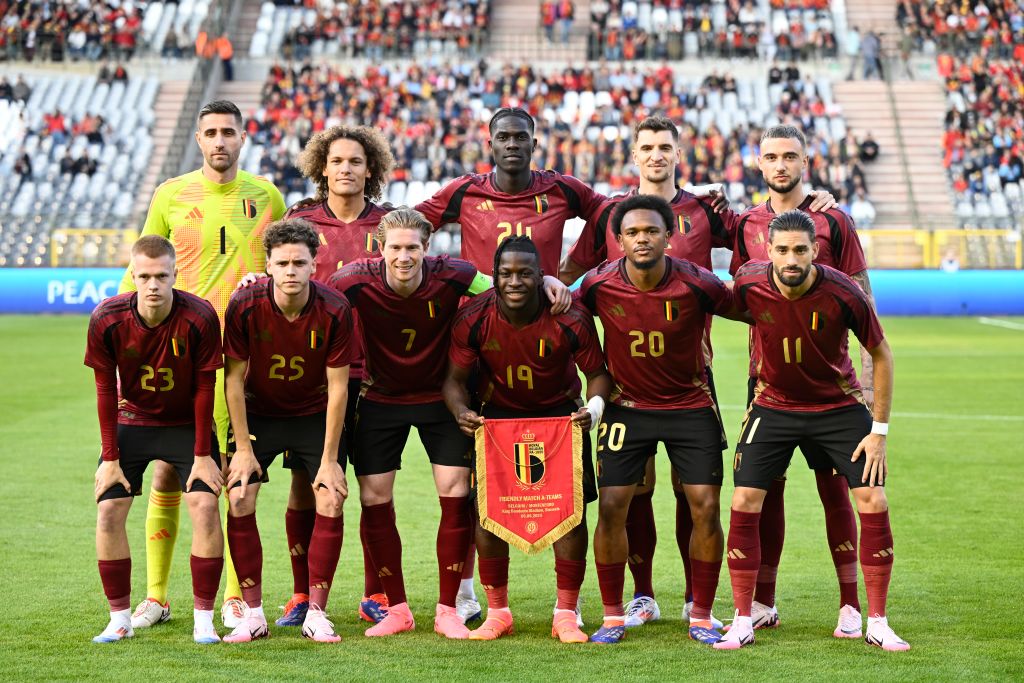
P = Pbefore + I * (W – We). That’s the equation FIFA use for their world rankings, if that answers your question. But expect it doesn’t, because in our heads it’s always turned into “P before I except after we”.
As you may have gathered from that, the way FIFA calculate their rankings is a bit complex, and can sometimes throw up some weirdness that doesn’t seem to tally with the common sense evidence of our own eyes.
Case in point: Belgium have come into Euro 2024 ranked third, behind Argentina and France, while Croatia are ranked ninth. We imagine Slovakia and Albania would have something to say about that.
VIDEO Why England Were SO Bad Against Denmark
How are the FIFA World Rankings calculated?
There’s a whole 1,259 word document about it on the FIFA website, with the current guidelines last revised in August 2018.
It essentially boils down to measuring the relative strength of any two countries playing one another in FIFA-sanctioned internationals – which includes friendly games as long as they are considered official – with points awarded or deducted depending on the importance of the games, the results, and whether or not that result was a shock.
Let’s break down the equation into the different factors as play, piece by piece, to get an understanding of how each part works.
Match results
This is the “(W – We)” part of the equation, so as you may have gathered, there’s two parts to this: what was the result achieved in the game, and what was the expected result going into the game?
It gets way, way more complicated from there, but essentially it takes into account the world ranking difference between two sides in the rankings going into the game.
So, to pick the most extreme possible example: if first-place ranked Argentina beat 210th-ranked San Marino, it adds very little to Argentina’s ranking and does little harm to San Marino. However, if the Sammarinese pulled off the biggest shock in football history by sticking it to Lionel Messi, it massively dents Argentina’s points total, and massively boosts San Marino’s.

Obviously, most games are not as extreme as that: if sixth-ranked Portugal beat the seventh-ranked Netherlands, it makes less of a difference than Lionel Messi being left crying in the Apennines. A draw between Portugal and the Netherlands would likewise have minimal impact, while San Marino snatching a friendly draw in Buenos Ares would still have fairly big consequences.
This is why you often see smaller nations willingly setting up friendlies against the bigger boys of international football: they have much less to lose and potentially much more to gain by doing it that way, rather than trying to grind their way up by constantly playing teams who are on their level.
There’s couple of conditions on that, however: winning on a penalty shootout only awards three-quarters as many points as winning in 90 minutes or in extra time, for instance, while teams who lose knock-out games at major tournaments don’t actually lose any points; the winning side simply wins them instead.
Match importance
The “I” in the equation is effectively a multiplier based on how important the game is, with a score allocated depending on the nature of the fixture.
For instance, if you’re playing a friendly outside an official international break, that’s only worth 5 points. Any game in the World Cup quarter-finals onwards is meanwhile worth the maximum of 60 points.
You probably get the gist from that, but if you’re interested, the full breakdown is as follows:
- 5 points: Friendly played outside International Match Calendar windows
- 10 points: Friendlies played during International Match Calendar windows
- 15 points: Nations League group stage games
- 25 points: Nations League play-off and final matches; qualification matches for Confederations finals (e.g. Euros qualifying, Copa America qualifying, etc); World Cup qualifying matches
- 35 points: Confederation finals matches up to (but excluding) the quarter-finals (e.g. the Euros group stage and round of 16)
- 40 points: Confederation finals matches from the quarter-finals onwards (e.g. from the Euros quarter-finals to the final); all FIFA Confederations Cup matches
- 50 points: World Cup finals matches up until (but excluding) the quarter-finals
- 60 points: World Cup finals matches from the quarter-finals onwards

Why is there some weirdness in the FIFA World Rankings?
Let’s look at Belgium as an example. They have done pretty well in the Nations League over the past few years, winning 11 of their 16 games and losing just four. But because the Nations League is split into divisions, they’re only playing against other high-ranking sides, meaning those defeats are not too costly – and Nations League group games are barely considered more important than friendlies anyway.
More significant is that Belgium have not lost a Euros or World Cup qualifying game since Wales beat them in a Euro 2016 qualifier nine years ago.
That is responsible for most of their ranking points; and while friendlies aren’t worth too much, they’ve been good in the ones they have played: they’ve only lost one of their last 23 exhibition games since 2016 (against Egypt, in 2022).

That has lifted Belgium’s rankings points total to the extent that even their recent poor showing at major tournaments – the only times you’re likely to actually pay any attention to them – won’t have done them much harm in the rankings.
That’s because at Euro 2020, Belgium won all three of their group stage games, which are worth quite a bit, and then beat 1) high-ranking Portugal, 2) in the quarter-finals, 3) without need for a penalty shootout – all of which adds up to a big points gain. Their subsequent quarter-final loss to Italy then didn’t cost Belgium anything at all, because remember, you can’t lose world rankings points in knockout games.
Belgium were then eliminated in the group stage at the 2022 World Cup, but only suffered one shock defeat, against Morocco. Before their Euro 2024 loss to Slovakia, that was was the only major blot on Belgium's copybook when it comes to how the world rankings are calculated.
Get a free live stream to watch Euro 2024 from anywhere in the world ahead of the summer's big tournament
More international football stories
We have a guide on how to get Euro 2024 tickets if you're still looking to go to the tournament. Can’t make it out there? Don’t worry: here’s how to watch Euro 2024 live streams from anywhere in the world
We have the run-down on Euro 2024 stadiums, with info on host cities, capacities, and everything you need to know.
We also have a list of the Euro 2024 favourites, with best odds on nations to win European Championship in Germany, while these are the best Euros games ever and these are the best pundits ever.







